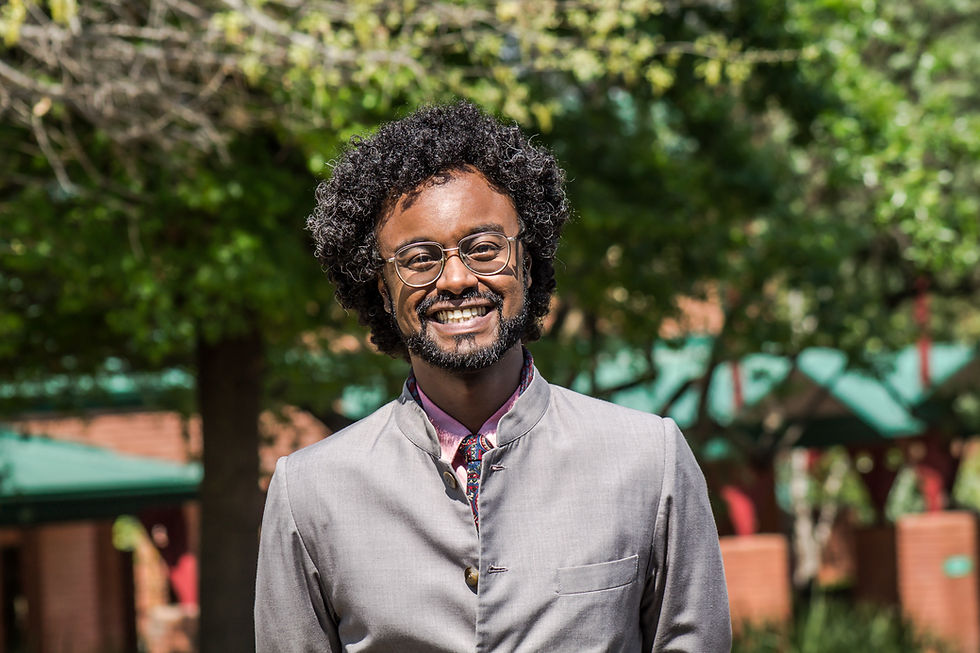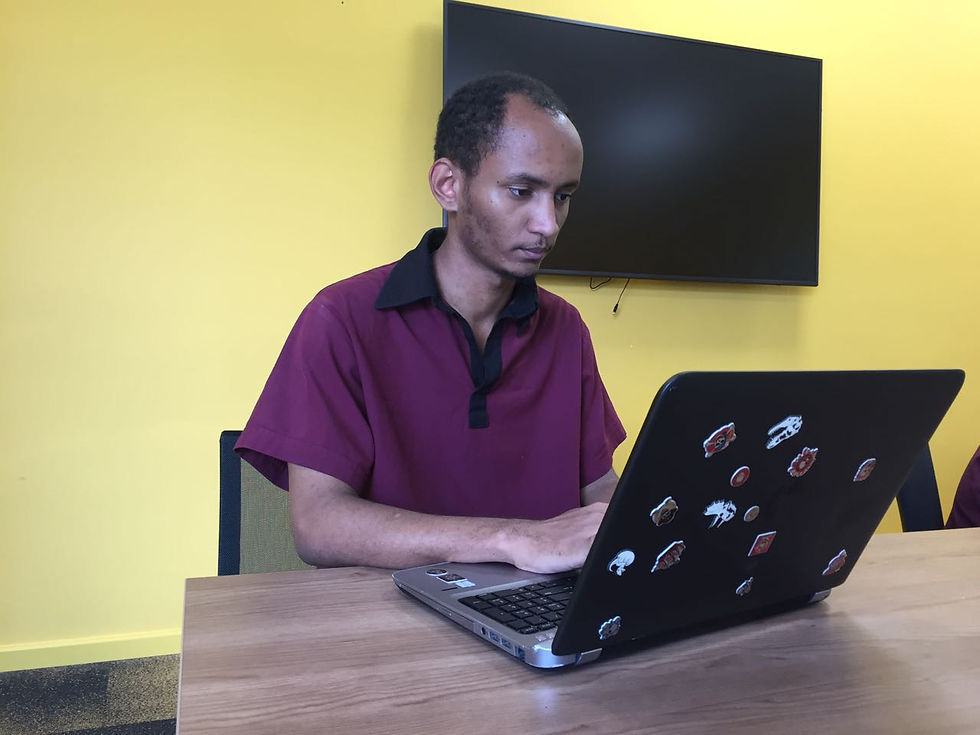Humans of ALA : Dean Hatim Eltayeb
- alaiansmedia
- Feb 27, 2018
- 7 min read
ALAians: Hello Dean Hatim
Dean Hatim: Hello ALAians
ALAians : Today you are our guest at ALAians Media and we are here to ask you a few questions about your role as the dean of the Academy. (-Great.) So, I am going to go over a few questions and you can share with us your sentiment about them.
Dean Hatim: Sounds easy enough.
ALAians : The first one is this: Can you share with us a moment at which you felt powerless as the dean of the Academy?
Dean Hatim: Terrific. So, the first memory that comes to mind is from the start of this academic year. So, it would’ve been September or August. It goes back to the first time the “English for excellence” summer camp started. Mr. Jake was organizing for 14 students to arrive one month early at ALA to spend some time immersed in the E4E curriculum to give them an onramp from which to enter the ALA academic program, which I think was a great idea. One morning I received a text message from Mr. Jake, (the Campus was still quite empty and most of the teachers are not back there and no students here) saying there is a student who was supposed to arrive this morning at 5 AM, it’s now 9 AM and we have no trace; we can’t find this student. It’s in moments like those that we go into crisis and we say “alright, we have a student for whom you’re responsible and we can’t even tell you where he is and all the worst thoughts in the world will come to mind obviously. So, we reached out to the Airline, we reached out to the student’s parents and we established that the student had left from his home country, had arrived in the transit location (the airline initially was saying that he had boarded from that transit location and landed in Johannesburg) but he never arrived in the airport and customs said that he never came to the customs control. So, we had no idea where that student was: he could be anywhere in South Africa and he could be anywhere in Africa for that matter. We followed all the steps of the policy which we were supposed to follow in that situation and came to a point where all we can do is wait until more information arrives because you can’t speak to the police yet, not enough time has lapsed, we already sent someone to the airport to look for him and for at least about an hour, I felt completely powerless. There was nothing I could do to improve the situation. Then, it turned out that the student had missed his connecting flight when he was in Addis Ababa. So, he was going to take the next flight and he arrived safely shortly afterwards.
ALAians: Great, thank you Dean Hatim for this really touching story. So, now to go on with our second question, when did you realize you wanted to be a dean of education of a school like ALA?
Dean Hatim: I think even after the first six months of doing this job I wasn’t sure what this job was. I remember when I was first discussing the possibility of applying for this position, it seemed completely unimaginable frankly. It wasn’t something that was in my plans and I thought “yeah I’ve spent some time in education, but I have interest in other areas.” I feel very strongly about ALA and about the potential of ALA, but I didn’t intend to come back so soon actually. When I first left I said I will come back in 25 years. And, even when I was interviewing for the position on campus, I remember articulating to Dean Uzo and Mr. Bradford at the time that I didn’t really feel like I understood the position, but I had a lot of fun talking to everybody. I think that each day that I have the privilege of continuing to do this work, I become more and more appreciative of the community that I get to be a part of, the conversations that I get to participate in and the impact that I think, collectively, we can have on each other and on the future of the continent. Each day confirms for me why I like doing this job. But I can’t say that there was a day that I said: “I really want to do that in the future” and that I aimed for it.
ALAians: Alright, thank you for that personal story. What is the most enjoyable part of your work and what is the least enjoyable part of your work?
Dean Hatim: Most enjoyable part of my work, without question, is interacting with people in imaginative conversations, some of them work-related and some of them more about how this community should work, how should it run, which should our aspirations be. Some of them are not related to work, some of them are just; let’s talk about philosophy, or let’s talk about Africa, or let’s talk about the future. I say people because I have those sorts of conversations with faculty members, with staff members, with peers, with colleagues, but, of course, I also get to have them with students. Those moments of intellectual rediscovery and encounter are by far the most enjoyable part of this work. The least enjoyable part of the work, I would say two things: a significant chunk of my time each day spent behind a desk writing and responding to, or reading emails. That just has to happen because there is a lot of information that is being passed through and responded to. But, I try to not let that overwhelm the day. I would say another difficult part of the work is when I have to call a parent with bad news or an unhappy topic. I think it’s a tough but important part of the work. But, I can’t say it’s enjoyable for saying.
ALAians: Alright, so now moving on a bit from your work, to ALA as a community as a whole: what topic do you think is underdiscussed at ALA ?
Dean Hatim: Just comparing my experience of conversations that I’ve had so far in the past year and a half to the conversations I had in the first three years that I had at ALA, and maybe it’s because I don’t sit at the African Studies table anymore, and I should probably test that theory and sit there once a week, the big broad topic is Africa. I don’t think that I have nearly as many conversations about Africa as I used to, but that breaks down, I think, to more specific subjects of concern that we know are going to be important for the future of the continent and that we know we have to have a role and an impact on. So, things like climate change, or economic justice, or gender equality and liberation of women. I don’t know that I have enough from those conversations about those things with my peers than with students. I mean, I think if you compare the amount of conversations that we have about that versus the amount of conversations that we have about universities, the number would not be inspirational.
ALAians: It might be true that the focus changed a bit over the course of ALA.
Dean Hatim: Yes maybe, which means that it can change back.
ALAians: That’s true. Is there one thing that you really want to change at ALA but cannot do it due to various reasons, which can literally be anything?
Dean Hatim: I will just add one word to your question: cannot do it “yet.” The, again, big box is time off campus. I think a specific version of that would be “I wish that there were more opportunities for students and staffulty members to experience nature, go on more hikes and go on longer camping trips.” A, because I think time and nature, either alone or in groups, is a really strong intellectual stimulant, I think it’s a very strong bonding experience and I think that the more we think about our relationship with the planet, the more humble you become and also the more motivated we become to purse progress. But, unfortunately, going on a camping trip, or going to the museum, or spending time in a near park of Johannesburg is a difficult endeavor for reasons of security, for reasons of logistics and for reasons of how busy the school day at ALA is. While I wish I could snap my fingers and transform it so that every student is going off campus three times a week, it’s not yet attainable.
ALAians: Fair point. What could students do to help you do your job or to improve the community?
Dean Hatim: I don’t think students need to help me. I’ll actually start by saying that many students do help me do my job, and I’m actually really touched by it. Even last week, a student, noticed that I was struggling with a big question and reached out to me and said: “hey would you like to sit down and talk about this? I have some ideas.” That meant a lot to me to receive an email like that because it is a reminder that we are a community of peer human beings and it is really great to see a student step up to that opportunity. But, in the big picture I think if I could influence ALA students to do a set of things, it wouldn’t be for them to help me. It would be for them to see ALA as an opportunity to invest in creating a society that doesn’t exist somewhere else. That can be by investing time and energy into building, supporting, leading, or enriching a club or society like you do with chess and that’s a meaningful contribution to the life of the community. It could be by dedicating the time ethically and responsibly to student leadership opportunities, and it could be by asking good questions. I think ALA students can, they don’t always, but can ask good questions from me and from other members of the administration. Especially at this time of year, as second year students approach the last quarter of their time at ALA, the more they feel invited to and able to make a lasting impact on the way that ALA is, the better our community will be.
ALAians: Thank you very much Dean Hatim for your time and for this short interview.
Dean Hatim: Thank you for the opportunity.





Comments